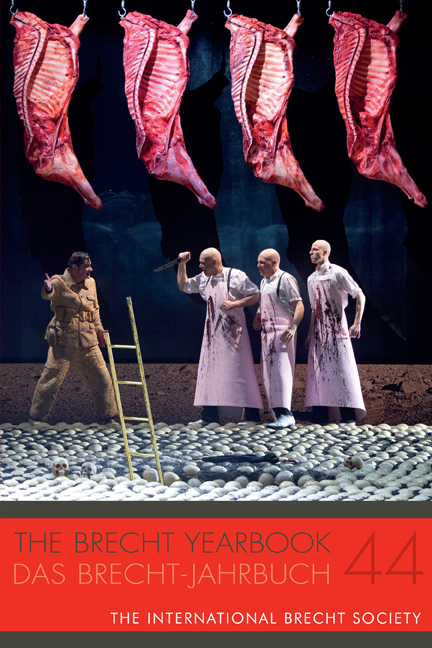Book contents
- Frontmatter
- Officers of the International Brecht Society
- Contents
- Editorial
- List of Abbreviations
- Brecht, Günter Kunert, and Edgar Lee Masters
- Brecht’s Dramatic Fragments
- Pure Joke: The Comedy of Theater since Brecht
- New Brecht Research
- Book Reviews
- Notes on the Contributors
- Now at De Gruyter Exilforschung Ein Internationales Jahrbuch
Ela E. Gezen. Brecht, Turkish Theater, and Turkish-German Literature: Reception, Adaptation, and Innovation after 1960
Published online by Cambridge University Press: 09 February 2021
- Frontmatter
- Officers of the International Brecht Society
- Contents
- Editorial
- List of Abbreviations
- Brecht, Günter Kunert, and Edgar Lee Masters
- Brecht’s Dramatic Fragments
- Pure Joke: The Comedy of Theater since Brecht
- New Brecht Research
- Book Reviews
- Notes on the Contributors
- Now at De Gruyter Exilforschung Ein Internationales Jahrbuch
Summary
Brecht's works have been discussed in many international contexts; the Brecht Yearbook alone published two issues on Brecht in Asia and Africa (1989) and Brecht in/and Asia (2011). Brecht's reception in Turkey, however, has received little attention so far. Only one dissertation, Albert Nekimken's Brecht in Turkey, 1955–1977 (1998), focuses on Brecht's impact on Turkish dramatists and Turkish revolutionary theater. This dearth of research on Brecht's reception in Turkey may be particularly surprising since the Turkish-German community represents the largest minority in Germany and since Brecht's plays and theatrical theories played an important role in left-wing artistic movements in Turkey.
Ela Gezen's book now fills this important lacuna. Following an introduction, her monograph is divided into three chapters. The first chapter offers a historical overview of Brecht's reception in Turkey in the 1960s and 1970s, between Turkey's first military coup in 1960 and its third one in 1980. The following two chapters focus on two Turkish-German artists whose work is strongly influenced by Brecht: Aras Ören and Emine Sevgi Özdamar.
The first chapter, “Intersections of Politics and Aesthetics: Bertolt Brecht in the Turkish Context,” concentrates on cultural relations between Germany and Turkey as they relate to Brecht. Transnational cultural practices are never unidirectional (15); and while many Turkish citizens emigrated to Germany for economic or political reasons beginning in the 1960s, in an earlier period, during World War II, Turkey took in German and Jewish intellectuals: Leo Spitzer, Ernst Reuter, and Erich Auerbach are famous examples. Brecht could have traveled through Turkey as well, as he expressed in a 1941 letter from his Helsinki exile to Hanns Eisler, but the route through Turkey never materialized. Brechtian theater came to Turkey after the 1960 military coup, when a new constitution established a parliamentary democracy in Turkey and allowed freedom of expression. Marxist literature was translated into Turkish and new socialist journals emerged— such as Yön, Ant, and the arts and theater journal Oyun and its successor Tiyatro. New theater ensembles were established in the 1960s and theater departments were founded at major Turkish universities, for example, the Ankara University Theater Institute (19).
- Type
- Chapter
- Information
- The Brecht Yearbook / Das Brecht-Jahrbuch 44 , pp. 241 - 245Publisher: Boydell & BrewerPrint publication year: 2019

